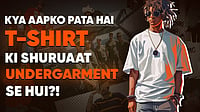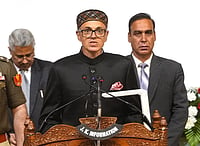It's a small thing, but I might as well give the correct story. Vinod had just joined the Observer and I succeeded him at Debonair (but I wasn't his assistant editor; the editorship was my first journalistic job). I had been Debonair's film critic for Vinod, and asked around for a replacement. I heard of the highly unlikely story that a commissioner of income tax wrote well and was interested in cinema. Iqbal Masud was requested to write a film review on spec. "Too literary," I said to him when I saw it. He did a revised piece. "Better, but still too literary," I said to him. The third time, it was just right: apt literary allusions, a critical look at the script, a careful weighing of social message and cinematic values. The income tax commissioner had begun a parallel career.
Encore, Knight Errant
Wars changed, but Iqbal Masud never once dodged the draft

The written word has always been important to Iqbal Masud, which is what endears him to the French. But originally, as these memoirs tell us, the language he learnt was not European but Arabic and Urdu: Masud had what is disparagingly called a "municipal education", supplemented by his mother's insistence that he read the Quran.
His mother was obviously an important influence. She was an Urdu writer and a worker in the Khilafat movement. And "the embodiment of Islamic puritanism" who made sure that the young Masud prayed five times a day and from the age of seven fasted during Ramzan. She also drummed a message into him, which seems to have affected him deeply, that "in Islam one must be a hero". Masud dismisses that ruefully: "I knew I would never become a hero like Khalid or the great North African generals".
Perhaps. But reading his memoirs, I get the feeling that subconsciously Masud was trying to live up to his mother's dictum, and that even in the mundane, he tried to be a hero. What else can explain his quixotic decision to join the army? It was a career so unsuitable for a man of intellectual pursuits, that the army discovered its initial mistake and asked him to go.
What else can explain his decision to stay in India after Partition, despite pressure from family and friends? Masud writes of a girl he knew called Gulnar. A seductress twice over, not only does she want to marry Masud, she wants him to go with her to Pakistan. At the station when he goes to see her off, she says: "There is still time. If you are prepared to come I will go next week". Masud says: "What about Jagath, Motaiya and my group? So I betray them?" "It is not a question of betrayal but after Independence they (his Hindu friends) will always be number one. You will be number two."
"But I am number two. I may rise to number one," he says. And do I detect the hero instinct in Masud's determined resolve to be objective, fair and incorruptible in his job as income tax commissioner even when—especially during the Emergency—it would have been more convenient to bend a little?
Finally there is his UN assignment drafting income tax laws for countries in West Asia: "After the Egyptians left in 1967, Sana'a was besieged by a mix of royalists and British and Dutch mercenaries. Suddenly weakened, the Republican forces retreated into Sana'a. It's not easy to recount the experience of a three-month siege and continuous bombardment. The UN administrative official was Subash Rishi, a gutsy fellow. When the bombardment became intense, both of us went to the Russian ambassador. India and Russia were close and he wanted to know what the Russians intended to do."
"What we got was a torrent of high-minded talk from the ambassador. 'How can you think of leaving? India and Russia are great powers, we cannot run away.' Charged by this talk, I came home and started finalising the Income Tax Act. Next morning Rishi rang me at six. 'What are you doing?' 'Preparing the Refunds Chapter of Income Tax law.' 'Forget it. The Russians left the city an hour ago,' he told me."
That passage is not atypical of the book which goes back and forth from Muslim-ness to cinema to prejudice in the bureaucracy, but retains its dry sense of humour. It makes the memoirs a very good read, the kind you would finish in one sitting.
A reading of Dream Merchants also explains something which we who know Masud had found inexplicable: his apparently sudden conversion to Defender of Islam, the transformation of a literate, thinking man of the world who now rejoices in his role in getting Salman Rushdie's Satanic Verses banned in this country without reading it. I cannot agree with him on this at all, but I understand him better. And I understand a little bit more than I did what it must be like to be a Muslim in India.
It was enterprising of the editors of Harper Collins to commission this book. I wish it had happened earlier when Iqbal Masud may have had the stamina to write a bigger book. Actually three bigger books. Their seeds are all here, waiting to grow.
- Previous Story
 Review Of The Dust Draws its Face on the Wind: A Mysticism That Melts The Burdened Sky
Review Of The Dust Draws its Face on the Wind: A Mysticism That Melts The Burdened Sky - Next Story




















